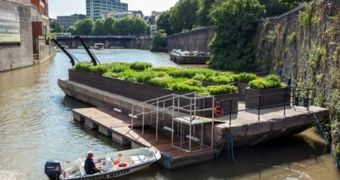Unknown to many, countless plant seeds are presently resting at the bottoms of rivers worldwide, as a result of sailors carrying them there together with the ballast used to weigh their ships down.
Interestingly enough, it seems that although some of these seeds date back from the 1700s, or the 1900s at the earliest, they can still be brought back to life and made to teach people one or two history and biology lessons.
This is precisely what Brazilian artist Maria Thereza Alvesis aimed to do when she decided to dig up some of these seeds, plant them in an old barge and send them floating down a river in Bristol, UK.
Thus, together with the University of Bristol Botanic Garden, she set up the basis for what is now known as the Seeds of Change project, which aims at raising awareness with respect to how many foreign ships made their way into Bristol's harbor simply by showing off the non-native plant species grown from seeds brought back to life after hundreds of years.
Apparently, her work wishes to prove that non-native plant species are not such a big threat to local flora, provided that their growth is well kept under control.

 14 DAY TRIAL //
14 DAY TRIAL //